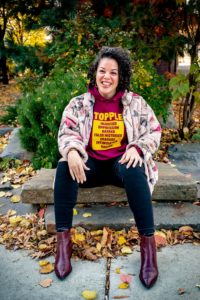 Monthly, we’ll be highlighting the regional leaders who are helping lead the work of The Promise and asking them the question, “What’s YOUR Promise?”
Monthly, we’ll be highlighting the regional leaders who are helping lead the work of The Promise and asking them the question, “What’s YOUR Promise?”
To kick things off, we’re chatting with The Promise Governing Board Member Tiffany Tavarez.
How long have you lived in Philadelphia?
21 years.
What do you love most about this city?
I love the “family” I’ve been able to create for myself – friends, alumni, mentors, mentees, co-workers, neighbors – over the years. They are pure gold.
Tell us what you do, professionally.
Lead the Wells Fargo Technology DE&I Council responsible for global representation, mobility and inclusion; and communicate stories that showcase our work & our future.
How would you describe Philadelphia?
Philadelphia is a feisty village, creative, evolving, abundant with opportunity. It reminds you of the vastness of the world and your robust place in it.
What interested you most about The Promise?
I find the eclectic mix of public-private partners, investors and collaborators to be unique; they reflect the complexity of this untapped opportunity. The organizations involved with The Promise reflect the diversity of our city and it is a strength we can leverage for further access and impact for those [among us] who need it most. Lastly, the leadership – from our Board, to [the] Poverty Action Fund and United Way staff – are excellent at what they do. I was interested in learning from, supporting and showcasing that excellence.
Why do you think poverty remains Philadelphia’s biggest challenge?
Racism. Yes, it is true that schools and local nonprofit entities continue to be underfunded; and there are policies and practices that restrict, and even prevent, incremental advancement in affordable housing, immigration reform, environmental justice, and fair & equitable pay for those considered most marginalized. However, it is the underlying effects of systemic racial discrimination that has two-thirds of Philadelphia’s poorest communities identifying as either Black or Latino. Our current “reckoning” of our history’s most dangerous social construct is so fundamentally tied to how we operate that it has become the lens in which we judge a community’s economic viability and historical value.
As the work of The Promise continues, what are you most interested in learning along the way?
I have always been interested in learning why and how poverty continues to be so prevalent in our city. [The] United States is the richest country in the world and yet, has the largest wealth gap. Philadelphia’s economic narrative continues to live right in the middle of that fact despite the continuous investments in the people, programs and services that aim to alleviate it. Additionally, I think there is an opportunity to learn and spotlight who is actually making progress: what entities have been able to scale their solutions in ways that are inclusive and measurable. I want to learn how to lift them up as a template to follow and [as a] standard to live by. There is good work happening; I don’t think we hear enough about it.
As a member of the Governing Board, what’s YOUR promise to Philadelphia?
A single mother, an extraordinary woman raised me. She did her best to ensure our low-income household, with very limited access to quality education, work or healthcare, did not deter our ability to envision what was possible for my future. I promise to keep my own journey at the forefront of actions and words that can potentially influence someone else’s journey. I promise to be motivated by what the community needs and not by what our stakeholders commit to providing. I promise to make my community, and my mother, proud.


